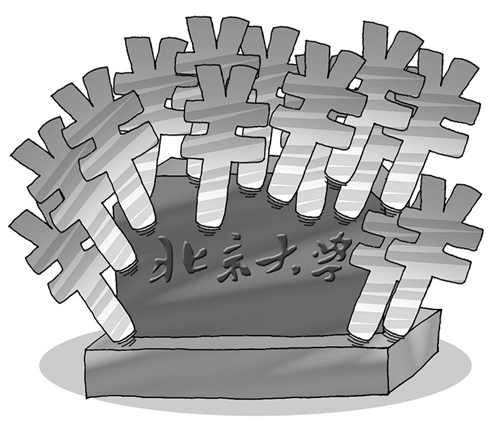PKU should stress books, not billionaires
- By Guang Qian
 0 Comment(s)
0 Comment(s) Print
Print E-mail
China.org.cn, July 5, 2011
E-mail
China.org.cn, July 5, 2011
|
|
|
Peking University has created 79 billionaires in recent decades. |
Peking University, widely considered the top academic institution in China, has also proven to be a wealth factory, turning out some of the country's richest businesspeople. According to recent media reports, 79 of the school's alumni from 1999 to 2010 have gone on to become billionaires, the most of any academic institution in the country. PKU President Zhou Qifeng has expressed great pride at this distinction. I don't share the feeling.
Established in 1898 as the Imperial University of Peking during a period of reform, the school was created as a replacement for the Guozijian, the top institute of learning in ancient China for more than a thousand years. In 1895, Emperor Guangxu issued an imperial edict making the construction of universities one of ten national priorities. At that time, Chinese scholars and reformers saw education as a way to produce the political and academic talent needed to carry the country forward. "The root of reform lies in education," Chinese scholar Liang Qichao wrote. "Talent comes from establishing schools."
Instead of producing wealth, scholars of the day envisioned the university educating patriotic graduates to carry out their duty of improving China. As another scholar, Li Duanfen, put it: "Once schools are established, there will be enough talent for our country's administration and restoration."
Peking University, then, was an academic and political institution from its inception, not an incubator for the country's next generation of business moguls. In ancient China, businessmen occupied the lowest of social classes, and business was limited by the emperors of China for several thousand years. Today, that perspective has changed, but the importance of business should not be overstated. Should we feel proud when our top universities' goal is to produce rich businesspeople?
When it comes to advertising campaigns, Harvard University never publicizes its billionaire graduates. Instead, it emphasizes the ranks of Nobel Prize winners and American presidents it has trained. Harvard has produced so many important political and academic figures over the past several hundred years because it grasps the basic principles of education. Bill Gates dropped out of Harvard when he was in the third year of university. Without a doubt, Gates is richer than all of the 79 billionaires mentioned above. But Harvard never uses him as a publicity tool.
There is a phenomenon in China's film industry that if the plot for a movie seems too bland, directors simply insert a vulgar love story. It seems a similar phenomenon has now cropped up at Peking University. If the university fails to cultivate enough academic or political elites, it simply counts the number of rich graduates it has produced. We are at the precipice of losing our educational roots.
A university should not pride itself on the number of rich graduates it churns out. The ultimate purpose of education is to cultivate true talent. On one hand, these talented graduates should have the capacity to improve people's lives. On the other, they should be able to upgrade China's international status. Education officials should take a serious look at the regulations of the Imperial University of Peking drafted by Liang Qichao. It is not too late to correct our mistakes.
(This post was first published in Chinese and translated by An Wei)
Opinion articles reflect the views of their authors, not necessarily those of China.org.cn







Go to Forum >>0 Comment(s)